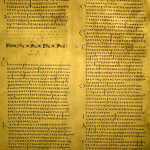If Susan Pevensie from the Chronicles of Narnia were a real person (or if I were a fictional one), we’d probably have ended up together, at least for a while. I can see us now: zipping through London on my Lambretta, gobbling leapers and thrashing rockers to a soundtrack by the Who, until Profumo got hold of her number.
For those who don’t know their Narnia books, Susan is the only character in C.S. Lewis’ seven-volume Christian allegory who backslides. In the last section of the final volume, we’re told she’s disavowed her childhood adventures in a parallel universe governed by a Christlike lion and surrendered herself to the adult pleasures of our own corrupt world. Lewis names “lipstick, nylons and invitations” as Su’s new diversions, and I’ve always read them as code words, an uptight Irish Protestant’s way of calling the grown-up Susan a roundheels.
For the past few weeks, I’ve given myself leave to pull a Susan. Lipstick, nylons and invitations (however you want to read them) have been pretty thin on the ground, as usual. But I did decide consciously to back off the whole religion thing for a while, to re-enter the World as what frat boys call a G.D.I — a God-Damned Independent — and what Pew researchers call a “none,” just to see how I liked it.
It wasn’t bad. It wasn’t great, either. What really surprised me, in truth, was just how little change I experienced. In both places, I saw roughly equal numbers of Democrats and Republicans, divided by roughly equal degrees of animosity. In both places, I saw lots of Latinos. Running from Fr. Z, I ran into Bill O’Reilly. Basically, the experiment was a wash.
I take is as proof that I never quite climbed aboard the Catholic bus, never went totally metanoid, a fact I put down in large part to a basic temperamental flaw: I’m religious, not spiritual. It’s not that I disbelieve in God, or rule out the possibility of His becoming incarnate through a virgin or hiding Himself beneath the accidents of appearance in the consecrated Host. It’s just that most of the time I can’t bring myself to care — not really. My imagination just won’t stretch that far. Heaven? Hell? Already seen ’em — they’re both in Scottsdale.
There are probably more people like me than would care to admit it. Even Jesus saw a need to jolly his audiences along with signs and parables. Ever since, the Church has thrown out its own cultural and sensual hooks, but none of them ever really caught me. Liturgy always seemed suspiciously fruity on one hand and suspiciously militaristic on the other, somewhat on the order Monty Python’s sketch, “Close-Order Swanning About.” I’ve never been a joiner; not even if Opus Dei created a new category of member, the super-duper numerary, who never had to do anything but answer group e-mails, would I be tempted to sign on.
All that being so, you’d think I’d have wanted to extend my hiatus, to serve Mammon a little longer. In fact, I was open to the idea — it crossed my mind I could sell one of those “Why I Left the Catholic Church” essays to Salon and join their staff as a religion writer. Neither Mary Elizabeth Williams nor Joan Walsh, though both are cradle Catholics, would know a motu proprio from a Motrin.
Instead, by the middle of last week, I sensed something tugging me back into the fold. The Holy Spirit? Not impossible, but if so, He was playing to my peculiar tastes, leading my inside with a trail of Max-friendly things. Here’s what some of them were.
A chance to see history in the making
I’m not sure the Catholic Church has ever lived through a really dull moment. But, at least by American standards, the period we’re in currently is looking like taurine for the soul. To review the highlights, we’ve had to come to terms with a sex-abuse crisis of global proportions while struggling to stay relevant in a depressed economy; to buck the government on the contraception mandate while deciding what to make of the nuns on the bus. Oh, and Christians worldwide are being hunted for sport.
This endless string of challenges is bound to bring out the worst in some people, but it’ll bring out the best in others. Catholics are re-visting all the big questions — how should the Church engage with society? How should it participate in the political process? George Weigel urges priests to fight what he calls the gay insurgency by refusing to act as witnesses in civil marriages. Eric Pavlat recommends that “faithful Catholics” form bourgeois intentional communities by fleeing to the same suburbs together. Like the ideas or not, they’re outside the box — or at least battering at the edges.
Now hiring dilettantes!
Last week in Baltimore, Catholic bishops and Catholic bloggers gathered at a conference with the imaginative title of “Bishops’ and Bloggers’ Conference.” Exactly what they talked about I don’t know — my invitation must have gotten lost in the mail. But it seems like pretty solid evidence that the folks on top are starting to take e-communication seriously as a medium for evangelization and dialogue. That must mean they’re starting to take those of us who’ve mastered the medium just as seriously.
Historically, by granting and witholding nihil obstats, the Catholic Church has done its best to guard the company brand. Typically, and maybe wisely, it’s given accredited wonks a monopoly on communication. In many Catholic leaders’ ideal world, a schmuck like me, who dropped out of a master’s program that didn’t even require him to submit a thesis, would be yoked to a plough and barred from trafficking in the printed word. But thanks to social media, the whole deal’s breaking wide open. Last summer, Patheos’ own Joanne McPortland picked a fight with Fr. Jim Martin, the brightest star in the Catholic media firmament, a man who stands within permanent handshaking distance of the great Colbert. She lived to tell the tale, a cat who roared.
I think there’s work for me here. If I’m good for anything, it’s speaking for people who were shaped by post-Woodstock America without finding it too horrible a place. It’s a perspective many Catholics — perma-grump Michael Sean Winters being only one — are a little too quick to reject out of hand. As for me, I rather like having an entire world religion as a potential captive audience. I’m sure it’ll backfire — if I ever get to meet Cardinal Dolan, he’ll probably boom out something like, “Great to see you, Marc! Never miss Bad Catholic!” But in that case, I’ll just tell him how much I loved that book he wrote with Ed Koch and move along.
A clean, well-lighted place
The future Pope Benedict predicted that the Catholic Church, as it shrank and lost its social clout, would undergo a spiritual “fresh blossoming and be seen as man’s home.” Sometimes I see signs of this. It’s not that this painful moment in our history has made us Catholics nicer to one another — good grief, anything but. Yet, in ways that often go unexpressed, it’s made us thankful for one another. With the attrition rate among Catholics so high, nobody wants to be the only sheep in the fold, the last person to get the joke. A friend from western North Carolina tells me that, according to a local truism, only kinfolk are worth shooting. That sense of resentment, balanced by a sense of connectedness, captures the mood of intra-Church bickering perfectly.
During my Susan Pevensie month, I checked my FB news feed frequently. I was surprised to note how many Church-related news items, memes, etc., came down the pike in a typical day. It struck me that, though I haven’t enclosed myself in a bubble — plenty of my FB friends aren’t Catholic — and don’t really belong to a community (a thing I tend to associate with gossip and pack rule), I had become part of a subculture, or maybe a fandom. My fellow Catholics and I share a frame of reference and a specialized vocabulary, When we want, we can talk in shorthand and trade in-jokes. More than that, when I consider the Catholics I know, I notice we share broadly similar habits of thought. We value ideas, often more than stuff. We have egos, but we tend to be wary of them. It’s not a combination of qualities I could hope to find just anywhere.
Actually, the only other place I’d expect to find it is the kind of New England college town where I’d always hoped I’d end up. You can picture it — Victorian houses, bike paths, faint tang of sea-salt on the breeze. Of a Sunday, I’d drop by a modest Protestant church presided over by a bowl-cut lady minister. But, like I said, I never finished my master’s, so that’ll have to be somebody else’s promised land.
But that place, with its perfect decorum and liberal high-mindedness, might go a little too easy on me. I am one of those people who feels truly at home only when he’s in an untenable position. The Greeks believed the shade of Tantalus was made to stand forever with thirst-quenching fruit and water just out of his reach. In the Catholic Church, I’m within grasping distance of notoriety, relevance, solidarity — all my heart’s desires. The catch is, I’ve got to learn to put up with rituals that irk me and grapple with doctrines that often give me fits.
A God who would put me through that is a God just clever enough to seem real, even to me. I believe I’ll stick around awhile.















